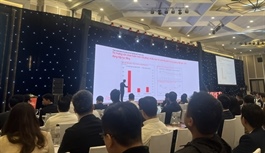“Significant” land division changes set
“Significant” land division changes set
The new regulations issued under the Real Estate Business Law to tighten land subdivision are hoped to have a strong impact on land plots nationwide.

The amended law, to become effective from 2025, regulates that private landowners will not be permitted to divide their land areas into many land plots and sell to others in cities of a special level and grade 1-3 urban areas.
The current law only prevents subdivision and sale of plots in wards of special-class urban areas and grade 1 urban areas directly under the central government, areas with high requirements for landscape architecture, central areas and buildings that are architectural highlights in urban areas, frontages of roads at regional level or higher, and main landscape routes in urban areas.
Thus, around 100 out of 900 urban areas across the country do not allow subdivision and sale of land plots.
According to statistics from the Ministry of Construction, of the 900 urban areas across the country, Hanoi and Ho Chi Minh City are classes as special areas, there are 22 grade 1 urban areas, 35 grade 2 urban areas, and 46 areas of grade 3. The remainder are grades 5 and 6.
Dinh Minh Tuan, director of property site batdongsan.com.vn in the southern region, said that the new regulations could have a big impact on the land market, including supply, customer profile and selling prices.
“Currently, 90 per cent of the supply in the land market comes from individual products that self-divide plots, then set up projects for sale. This type of land is diverse in price, area, and products. In particular, the product is easily accessible and suitable for the finances of the majority of buyers,” Tuan said.
He added that in addition, these types of land plots mostly appear in locations where infrastructure systems are upgraded.
“With the selling price is often cheaper than fully planned land projects from developers, both sellers and buyers tend to prefer self-separated land plots rather than formal land projects,” Tuan added. “Under this new regulation, the supply of private owned land plots launched in the market will be reduced sharply and buyers will face more difficult in accessing this type of real estate than before.”
Le Hoang Chau, chairman of the Ho Chi Minh City Real Estate Association, said that allowing land subdivision for sale as currently has increased the widespread abuse of plot separation and illegally transforming land with other functions into land with housing functions. It also disrupts urban development planning, wastes land resources, and creates real estate speculation.
“The tightening of land division and subdivision may reduce land buying and selling activities in the short term, the price of available land plots may be hiked up, but in the long run it will help the real estate market develop in a more transparent and sustainable direction, preventing speculation and waste of land assets that have occurred for many years,” Chau commented.
Meanwhile Ta Trung Kien, director of Wowhome Real Estate Company, said that tightening regulations are a drastic and positive measure to bring healthy development to the housing market. However, Kien believes that the new law will also have a significant impact on many individuals who want to separate plots for non-business purposes.
“In addition, the new regulations will make land supply and demand less diverse. If in the past, buyers can buy a land plot suitable with this budget. Now they will have to look for land plots in official projects with the higher price,” he added.
From a business perspective, Nguyen Chi Thanh, general director of Thanh Binh Construction Corporation, said that the Real Estate Business Law provides regulations that do not allow projects to be divided into plots and sold as plots. That is, the investor will have to carry out construction for the customer instead of selling land plots as previously. Thus, the value of the land plot will increase due to having to pay for construction, thereby limiting land speculation.
“Thereby, the land market will become more professional, businesses will practice building projects instead of just investing in infrastructure and selling land plots. At the same time, it helps land to be used more economically and effectively and avoiding uselessness of land,” Thanh said.
The new regulations are also expected to screen investors, forming more professional and capable real estate businesses. That means, only financial and technical enough businesses will be able to acquire a land area and divided into land plots to sell to buyers.




























